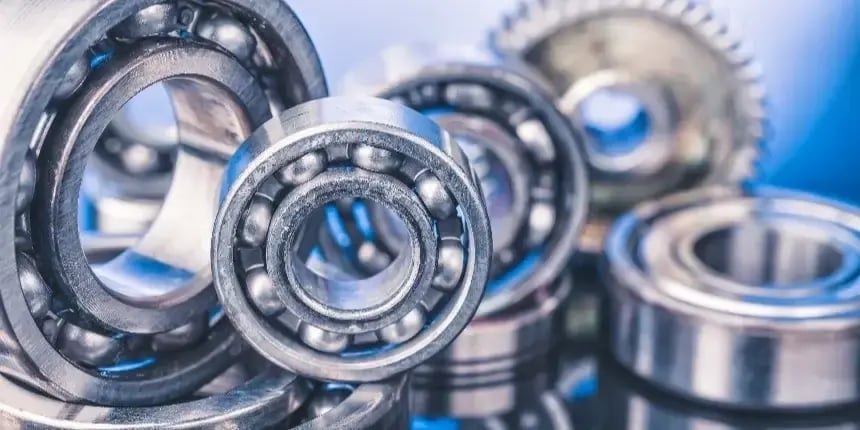Understanding Bearing Failure: Materials-Related Solutions

“Every bearing failure is unique due to its own set of operating conditions, and it’s usually a fairly complex problem; materials are one aspect of it, and I think that’s where Sullivan can really help.” – John Normandin, Owner, Bearing Consultants
A bearing failure, where a bearing doesn’t meet its expected lifetime or performance, has several possible causes and could have far-reaching consequences. It’s well worth matching a bearing component’s base material to its specific application demands.
In this blog post, we show how our knowledge of specialty steels can address bearing performance. We’ll also share insights from Todd Chavanne, Sullivan Steel Business Development, and John Normandin, one of our partner consultants and owner of Bearing Consultants LLC, to learn more about selecting bearing materials.
Causes and Types of Bearing Failure
“What the bearing is typically designed to do is run to a certain theoretical life before it begins to experience material fatigue.” – John Normandin
Fact: bearings don’t last forever. They constantly carry a load under normal operating conditions and eventually wear out. It’s when a bearing material fails sooner than expected that you have a problem.
Some causes of bearing failure:
- Improper lubrication
- Misalignment
- Contamination
- Excessive loading
- Fatigue
- Corrosion
- Unsuitable materials
Indications of a failed steel bearing include spalling, cracking, distortion, dents, or discoloration. Other clues, such as noisy operation, excessive vibration, or (in extreme cases) machine failure, can also point to a bearing problem.
Role of Materials in Bearing Performance
“A customer will say we’ve got distortion or we’ve got something plated right now, and we want to go to something that’s through-hard and stainless. And Sullivan works through those kinds of things to find different options, maybe even within the same material.” – Todd Chavanne
Addressing bearing failure starts with diagnosing the problem, as many factors affect bearings, not just the material. Customers often have already completed a failure analysis, and part of that could point to the bearing steel they’re using.
Depending on the problem, there are several options for improving material performance and extending bearing life.
Keeping the grade, adjusting the melt
Customers using a standard air melt grade might benefit from changing to a vacuum arc remelt (VAR) or a double melting process like VIM-VAR. A steel grade treated to a premium melting technique makes for a cleaner metal that’s less likely to develop subsurface cracks, which significantly increases bearing life. The nice thing about upgrading the melt is that it doesn’t require any process changes—simply choosing a different melt gets you a bearing steel with improved properties and microstructures for better performance.
However, the magnitude of the improvement you get from selecting a premium melt depends significantly on the grade, which is why it’s important to consult with one of Sullivan’s on-hand experts.
Diagnosing the process improvements
A suitable bearing material sometimes underperforms due to issues experienced during the bearing manufacturing process.
Part of Sullivan’s support includes manufacturing and heat treatment recommendations. Heat treatment can be complex and, particularly when hardening larger components, getting the heat treatment right can make the difference for developing bearing performance characteristics.
Switching to a superior grade
Sullivan stocks specialty-grade steels that deliver excellent performance characteristics even for critical applications. For instance, corrosion-resistant bearing steels that withstand exposure to harsh chemicals that are often seen in the medical, semiconductor, aerospace, and petro-chemical industries. We supply steels that perform to a range of demanding conditions.
Focusing on Bearing Performance with Sullivan
“What is it from the steel aspect that could have an influence on bearing failure? That’s where Sullivan gets involved.” – Todd Chavanne
There are many reasons a bearing can fail before its estimated lifetime. Some of those reasons are related to materials selection.
That’s where Sullivan’s engineering and metallurgy expertise comes into play—our specialty bearing steels are ideal for demanding applications that require one (or more) of the following characteristics:
- High hardness
- Fatigue resistance
- Corrosion resistance
- High strength
- Temperature resistance
Our experts understand the materials-related aspects of bearing failure. We support the metals we sell, and have competitive grades that help bearing customers avoid issues like corrosion, fatigue, and wear.
If you’re experiencing bearing failure and have questions about the material you’re using, contact Sullivan to begin an evaluation process. We work with our customers, internal experts, and partner consultants to determine what’s driving the problem and develop solutions together.
At Sullivan, we fully support the steel we sell!

